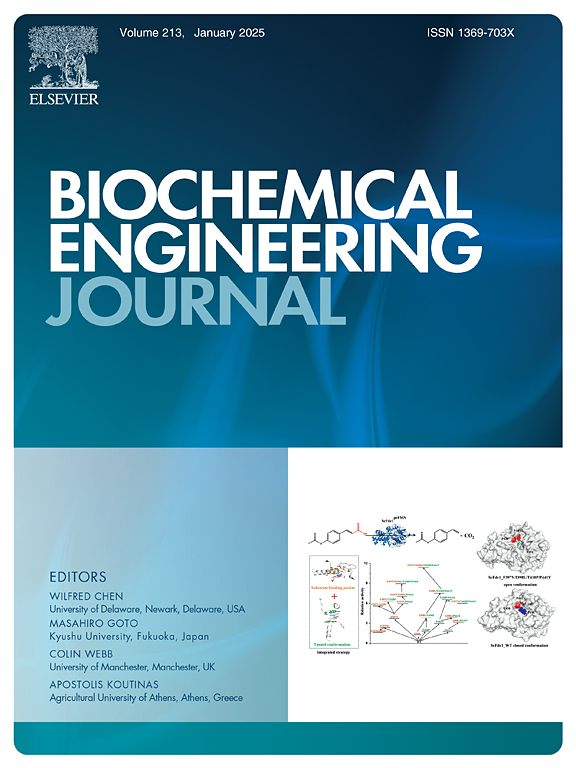在摇瓶中对溶解氧张力 (DOT)、pH 值、生物量和粘度进行组合光学测量
IF 3.7
3区 生物学
Q2 BIOTECHNOLOGY & APPLIED MICROBIOLOGY
引用次数: 0
摘要
摇瓶广泛应用于微生物工艺开发。通过人工离线取样来描述工艺流程既费时又费力,还存在污染风险。对关键参数进行在线监测可提供更深入的见解,同时节省时间和精力。本研究介绍了一种用于光学在线监测摇瓶中溶解氧张力(DOT)、生物量、pH 值和粘度的装置。溶解氧张力测量依赖于荧光氧敏感纳米粒子。纳米颗粒的荧光强度信号用于触发旋转液体中的 DOT 和散射光测量。即使在粘度较高的情况下,散射光信号(610 - 630 nm)也可与离线测量的光密度 OD600 相关联。pH 值通过固定在摇瓶内的 pH 传感器点进行在线监测。散装液体 Θ-Θ0 角度的变化与离线测量的粘度相关。粘度测量所需的散装液体前缘检测可通过氧纳米粒子的荧光强度信号或散射光信号进行。本文章由计算机程序翻译,如有差异,请以英文原文为准。
Combined optical measurement of dissolved oxygen tension (DOT), pH value, biomass and viscosity in shake flasks
Shake flasks are widely spread in microbial process development. Characterization of the processes by manual offline sampling is time-consuming, highly laborious and a contamination risk. Online monitoring of key parameters would provide deeper insights, while saving time and effort. In this study, a device for optical online monitoring of dissolved oxygen tension (DOT), biomass, pH value and viscosity in shake flasks is presented. DOT measurement relies on fluorescent oxygen sensitive nanoparticles. The fluorescence intensity signal of the nanoparticles is used to trigger the DOT and scattered light measurements inside the rotating bulk liquid. The scattered light signal (610 – 630 nm) can be correlated to offline measured optical density OD600, even at elevated viscosity. The pH value is monitored online by using pH sensor spots, fixed inside the shake flasks. The shift of the angle of the bulk liquid Θ-Θ0 is correlated to the offline measured viscosity. Detection of the leading edge of the bulk liquid, necessary for viscosity measurement, can be performed either using the fluorescence intensity signal of the oxygen nanoparticles or the scattered light signal.
求助全文
通过发布文献求助,成功后即可免费获取论文全文。
去求助
来源期刊

Biochemical Engineering Journal
工程技术-工程:化工
CiteScore
7.10
自引率
5.10%
发文量
380
审稿时长
34 days
期刊介绍:
The Biochemical Engineering Journal aims to promote progress in the crucial chemical engineering aspects of the development of biological processes associated with everything from raw materials preparation to product recovery relevant to industries as diverse as medical/healthcare, industrial biotechnology, and environmental biotechnology.
The Journal welcomes full length original research papers, short communications, and review papers* in the following research fields:
Biocatalysis (enzyme or microbial) and biotransformations, including immobilized biocatalyst preparation and kinetics
Biosensors and Biodevices including biofabrication and novel fuel cell development
Bioseparations including scale-up and protein refolding/renaturation
Environmental Bioengineering including bioconversion, bioremediation, and microbial fuel cells
Bioreactor Systems including characterization, optimization and scale-up
Bioresources and Biorefinery Engineering including biomass conversion, biofuels, bioenergy, and optimization
Industrial Biotechnology including specialty chemicals, platform chemicals and neutraceuticals
Biomaterials and Tissue Engineering including bioartificial organs, cell encapsulation, and controlled release
Cell Culture Engineering (plant, animal or insect cells) including viral vectors, monoclonal antibodies, recombinant proteins, vaccines, and secondary metabolites
Cell Therapies and Stem Cells including pluripotent, mesenchymal and hematopoietic stem cells; immunotherapies; tissue-specific differentiation; and cryopreservation
Metabolic Engineering, Systems and Synthetic Biology including OMICS, bioinformatics, in silico biology, and metabolic flux analysis
Protein Engineering including enzyme engineering and directed evolution.
 求助内容:
求助内容: 应助结果提醒方式:
应助结果提醒方式:


